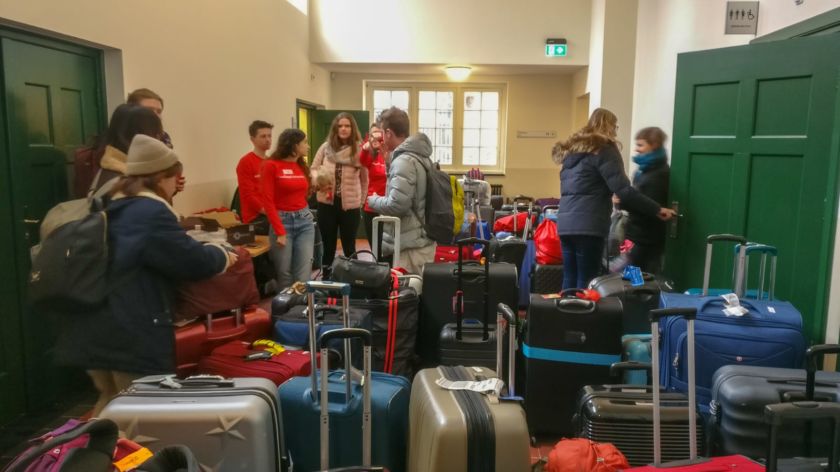International students react to Tweede Kamer discussions: ‘I feel like I am not welcome in the Netherlands’
-
 Internationale studenten tijdens de introductie in 2019 in het Berchmanianum. Foto ter illustratie. Fotograaf: Tom Hessels
Internationale studenten tijdens de introductie in 2019 in het Berchmanianum. Foto ter illustratie. Fotograaf: Tom Hessels
Last week, the Dutch House of Representatives (Tweede Kamer) discussed international students in the Netherlands. While many politicians have concluded that there are too many of them, international students themselves have been largely absent from the debate. Vox talked to three of them about the discussions. ‘Having fewer international students will not solve the problems the Netherlands is facing.’
‘The way I see it, this debate is a way for the Dutch government to address the housing crisis,’ says Dangira Burdaite, an international student from Lithuania. ‘They are blaming international students for the bad housing situation in the Netherlands.’ The debate Burdaite refers to took place last Tuesday in the Dutch House of Representatives. Six hours – that is how long the ‘problem of international students’ was discussed.

Since then, Minister of Education Robbert Dijkgraaf and the House of Representatives have asked Dutch universities to stop their active recruitment of international students. Additionally, political parties like the VVD and CDA have demanded a maximum for students from non-European countries, as well as the possibility for universities to limit the overall number of English-speaking students.
168 countries
While international students have been a topic in Dutch politics for years, current factors like the escalation of the housing crisis have kindled a new interest in the issue. The 23-year-old Arts and Culture student Burdaite is afraid that the current discussion in the House of Representatives will worsen the struggles that international students face: ‘I am afraid that this debate will enhance xenophobia.’
‘I feel like I am part of a problem instead of being part of a community’
According to the Central Bureau of Statistics, 115.068 international students from 168 countries were enrolled at Dutch universities last year. Furthermore, over the past sixteen years, the number of international students has increased more than the number of Dutch students. While international students now make up around 10,6 percent at Radboud University, an average of 40 percent of first-year students in the Netherlands are not Dutch.
For Jimena Zarco Ramírez, an international student from Mexico, it is obvious why the Netherlands is such a popular destination for students from all around the world: ‘People who went to school with me in Mexico cannot believe that I am studying in a building like the Erasmus Building. Even the shittiest classroom here is still amazing.’ The 21-year-old Philosophy, Politics and Society student enrolled at Radboud University mainly because of the university’s high standard of education.

While Zarco Ramírez is happy about the study programme she chose, she was not prepared for the rejection she would face in the Netherlands: ‘I did not expect to feel so unwelcomed when coming here. To me, it feels like I am trying to fit into a society that spits me out constantly. Because of my nationality, I am experiencing a lot of struggles and resentment when looking for housing and jobs. That makes it really difficult to participate in this society.’ This feeling is enhanced by the current debate about international students, says Zarco Ramírez. ‘It makes me feel like I am part of a problem instead of being part of a community.’
‘I made all this effort to integrate and now you don’t want me anymore?’
‘I have spent the last three and a half years learning the language, trying to integrate, and creating the feeling of home for myself,’ says Tim Wiesner, an Artificial Intelligence: Intelligent Technology master’s student from Germany. Reading about the debate in the Houses of Representatives, the 23-year-old felt affronted. ‘I thought: I made all this effort to integrate and now you don’t want me anymore?’
Not welcome
While Wiesner understands certain arguments of the debate, he is concerned by the lack of made-to-measure solutions: ‘They are trying to find one solution for different studies, different cities, different situations, which does not work. Having fewer international students will not solve the problems the Netherlands is facing, including the housing crisis.’

Even though the current debate is making Wiesner feel like he is being ‘attacked without a reason’, he is planning on staying in the Netherlands. ‘I feel settled here. And I feel like I am adding something to Dutch society. I came here, I studied here, and I am going to work here. The Netherlands wins something if I stay.’ However, he can imagine that the current debate negatively affects other international students.
For Burdaite, the current discussion about international students greatly impacts her decision on whether or not to stay in the Netherlands after completing her bachelor’s degree: ‘It is important to feel welcome when planning your future in a country and this debate has made me feel like I am not welcome in the Netherlands.’



